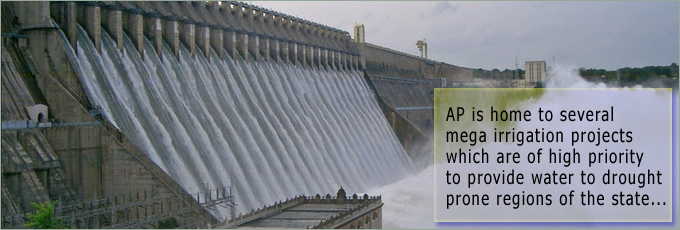|
The Andhra Pradesh government has put several irrigation projects on the fast track ahead of the imminent split of the state. The state recently inaugurated the KL Rao Sagar project, popularly known as Pulichintala project. The government intends to complete the project located in the Telangana region before the split. It also aims to complete the Sripada project, located in coastal Andhra, simultaneously.

The Rs 1,831 crore Pulichintala project was inaugurated in December 2013, 102 years after its conception in 1911. The project comprises a multi-purpose dam which will supply irrigation water to the Krishna delta and also generate 120 MW of hydro-electric power through its powerhouses.
The dam, constructed across the Krishna river between Guntur and Nalgonda districts, has a total capacity of 45.77 TMC, out of which 30 TMC will be live storage while the rest will be dead storage. The dam has 24 crest gates and will irrigate 13.08 lakh acre spread across Krishna, Guntur, West Godavari and Prakasam districts.
The other project which the Andhra Pradesh government has targeted to complete is the Sripada Yellampalli project in the Godavari region. The project aims to construct 62 flood gates and will be completed in two stages.
The Andhra Pradesh government has fast tracked some of the ongoing projects as the bifurcation of the state is likely to hit a couple of on-going irrigation, infrastructure and power projects, mainly due to the funding issues faced by the state during the transition period. Andhra Pradesh is home to several mega irrigation projects which are of high priority to provide water to drought prone regions in the state. Most of these projects have already been delayed by decades due to clearances and land acquisition issues.
One mega project which is likely to be hit by the formation of Telangana is the Pranahita-Chevella Lift Irrigation project. Entailing an investment of Rs 40,300 crore, the Pranahita-Chevella is the largest ongoing irrigation project in India.
The project will irrigate 16.5 lakh acre in Adilabad, Karimnagar, Nizamabad, Medak, Nalgond and Ranga Reddy districts. The project will have water diversion capacity of 160 TMC along with seven canal systems and 20 lifting points. Work on the project started in 2007 and as of now, around 55 per cent of the project is completed. However, what is feared is that the state bifurcation will certainly lead to funding issues and delay the project further.
In the midst of this, the union government’s decision to declare the Indirasagar Polavaram project as a national project has come as some sort of relief to the Andhra people. The national status will ensure central government financing and execution of the project at a much better pace than by the state government.
The Rs 17,300 crore Polvaram project was envisaged in 1980 as part of recommendations of the Godavari Water Disputes Tribunal (GWDT). The irrigation-cum-hydel power generation project proposes to provide irrigation to about nearly 7.20 lakh acres in East Godavari, Vishakhapatnam, West Godavari and Krishna districts. It also includes installing hydel power generation capacity of 960 MW, providing 24 TMC of water supply for drinking and industrial purposes to Vishakhapatnam town and steel plant and diversion of 80 TMC water to river Krishna.
What has been proposed
The Cabinet note on Telangana has stated that the terms of the Krishna Water Disputes Tribunal-II will be extended to recommend project-wise specific allocations and to determine an operational protocol for project-wise release of water in the event of deficit flows. The Bill also proposes setting up a two-tier institutional mechanism to manage sharing of Krishna, and Godavari river water and irrigation sources between the two successor states.
After the split, the execution of ongoing projects and envisaged new projects on Krishna and Godavari rivers shall be the responsibility of the successor state governments concerned where the project is located.
The draft Telangana Bill, which was recently cleared by the union cabinet, mentions the same thing about the future water sharing framework. The Bill proposes that an institutional mechanism with full involvement and participation of the central government will be put in place to manage water resources and projects on Krishna and Godavari rivers in an amicable and equitable manner.
Despite the central government’s efforts to ensure smooth execution of ongoing irrigation projects, the bifurcation of Andhra Pradesh will result in delays of irrigation as well as other infrastructure projects which are expected to serve both the regions.
|